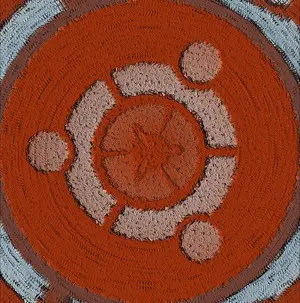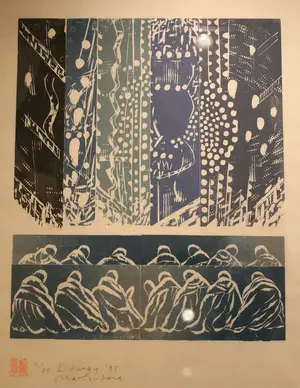A break from my usual scope, prompted by a question from a friend.
View attachment 15976
Liturgy B. Woodblock print. Matsubara Naoko, 1995.
Ubuntu/Hunhu philosophy, distilled to its essence by Michael Onyebuchi Eze: "A person is a person through other people." The term ‘ ubuntu' is from south African languages meaning "quality of being human." Ubuntu includes socio-economic and political history of southern Africa.
View attachment 15972
Ubuntu art
"A person is a person through other persons." I taste the words, cautiously. I poke at Google, even more cautiously, and the best possible person I personally could read shows up first, with this comment:
Ubuntu/botho is best understood as a critique of the idea that...the West should “humanize” or “civilize” non-Western cultures through colonization. --M. Eze
What would I make of this, my friend wondered. Um. I'll say Ubuntu/botho rejects the notion that people can label other people as 3/5ths of a person--as the US Constitution did, once. Or that there is a "White Man's Burden" (by the English Rudyard Kipling) to other hairless great apes of different colors. Is a people made a people through other people?
Arguably, yes: nothing unites us like an other who oppresses us. A nation exists because it shares food, language, an enforceable way of doing things internally, and a means of resisting change imposed externally. Groups define themselves by who's not included.
I'm not especially driven by political or economic interests, which may disappoint the friend who asked. This post isn't fueled by the kind of self-correction that would happen if the conversation could continue. So I'll go it alone.
The more exposed I am to information about just how northern Europe dominated the latter part of the last millenium, the more obvious it is that Jared Diamond's Guns, Germs, and Steel got it right: advanced biotechnology consistently defeated advanced humanism, and biotechnology is driven by money and hubris, the worst of humanism. How arrogant do you have to be to conceive the idea of Terra Nullia--if you don't claim your little patch with boundaries, then you can't possibly have any rights to any of it? And therefore no right to continue to live as you have done since before the dawn of time?
I should probably leave it there, but I can't. The same voyage through history and culture presents me with a horror: that I was lucky to be born where I was, because of how I see women living elsewhere. Only the Native American tribes before the white man came appear to have done better regarding the treatment of women and children. There are stories that white women taken into tribes refused to return once they'd learned to live in harmony with land and men, rather than included as property and subjugated by the latter. So I flinch when I hear of practices that made sense to cultures and depended upon sacrificing women and children. Child sacrifice, child labor, "white"(!) slavery, cliterectomies, suttee, foot binding...when I think about being the object of these practices, I wonder. How was it good to be a person made a person by persons who did these things to make women "worthy" as persons? Isn't this an alternative liturgy: the person made by other people may be broken by other people?
What does Ubuntu have to say about that? If feminism is the radical notion that women are people, who gets to say that women are people? If a woman goes to a culture not her own, is she still considered a person? Or is she just a woman?
I've read that the only reason the ancient Chinese empire stopped where it did was that it could not administrate any more territory using its existing technologies, administration, and war material. A similar argument was made for the empires of Alexander the Great and the Habsburgs. Spain staggered and fell under the weight of its own success: economic policies based on scarcity broke under unimaginable wealth. Time turned, and the British Empire saw its own political and economic policies collapse, as did Germany, and I don't expect the U.S. Empire--as I think of it--to end any differently.
They say China will be the next millenial empire. Chinese political and economic strategy includes African investment on a scale no other nation is matching. Or perhaps can match. Neither culture has shining records for ubuntu--if ubuntu recognizes women as people.
I am surprised to find myself here; this essay originally intended to consider ubuntu through the Asperger lens, until I hit the reference to colonialism. What's so about ubuntu for aspies and autists, if we are persons who can't be persons through other people?
View attachment 15976
Liturgy B. Woodblock print. Matsubara Naoko, 1995.
Ubuntu/Hunhu philosophy, distilled to its essence by Michael Onyebuchi Eze: "A person is a person through other people." The term ‘ ubuntu' is from south African languages meaning "quality of being human." Ubuntu includes socio-economic and political history of southern Africa.
View attachment 15972
Ubuntu art
"A person is a person through other persons." I taste the words, cautiously. I poke at Google, even more cautiously, and the best possible person I personally could read shows up first, with this comment:
None of us comes into the world fully formed. We would not know how to think, or walk, or speak, or behave as human beings unless we learned it from other human beings. We need other human beings in order to be human. I am because other people are. A person is entitled to a stable community life, and the first of these communities is the family.” --Desmond Tutu, retired Anglican bishop from South Africa
Ubuntu/botho is best understood as a critique of the idea that...the West should “humanize” or “civilize” non-Western cultures through colonization. --M. Eze
What would I make of this, my friend wondered. Um. I'll say Ubuntu/botho rejects the notion that people can label other people as 3/5ths of a person--as the US Constitution did, once. Or that there is a "White Man's Burden" (by the English Rudyard Kipling) to other hairless great apes of different colors. Is a people made a people through other people?
Arguably, yes: nothing unites us like an other who oppresses us. A nation exists because it shares food, language, an enforceable way of doing things internally, and a means of resisting change imposed externally. Groups define themselves by who's not included.
I'm not especially driven by political or economic interests, which may disappoint the friend who asked. This post isn't fueled by the kind of self-correction that would happen if the conversation could continue. So I'll go it alone.
The more exposed I am to information about just how northern Europe dominated the latter part of the last millenium, the more obvious it is that Jared Diamond's Guns, Germs, and Steel got it right: advanced biotechnology consistently defeated advanced humanism, and biotechnology is driven by money and hubris, the worst of humanism. How arrogant do you have to be to conceive the idea of Terra Nullia--if you don't claim your little patch with boundaries, then you can't possibly have any rights to any of it? And therefore no right to continue to live as you have done since before the dawn of time?
I should probably leave it there, but I can't. The same voyage through history and culture presents me with a horror: that I was lucky to be born where I was, because of how I see women living elsewhere. Only the Native American tribes before the white man came appear to have done better regarding the treatment of women and children. There are stories that white women taken into tribes refused to return once they'd learned to live in harmony with land and men, rather than included as property and subjugated by the latter. So I flinch when I hear of practices that made sense to cultures and depended upon sacrificing women and children. Child sacrifice, child labor, "white"(!) slavery, cliterectomies, suttee, foot binding...when I think about being the object of these practices, I wonder. How was it good to be a person made a person by persons who did these things to make women "worthy" as persons? Isn't this an alternative liturgy: the person made by other people may be broken by other people?
What does Ubuntu have to say about that? If feminism is the radical notion that women are people, who gets to say that women are people? If a woman goes to a culture not her own, is she still considered a person? Or is she just a woman?
I've read that the only reason the ancient Chinese empire stopped where it did was that it could not administrate any more territory using its existing technologies, administration, and war material. A similar argument was made for the empires of Alexander the Great and the Habsburgs. Spain staggered and fell under the weight of its own success: economic policies based on scarcity broke under unimaginable wealth. Time turned, and the British Empire saw its own political and economic policies collapse, as did Germany, and I don't expect the U.S. Empire--as I think of it--to end any differently.
They say China will be the next millenial empire. Chinese political and economic strategy includes African investment on a scale no other nation is matching. Or perhaps can match. Neither culture has shining records for ubuntu--if ubuntu recognizes women as people.
I am surprised to find myself here; this essay originally intended to consider ubuntu through the Asperger lens, until I hit the reference to colonialism. What's so about ubuntu for aspies and autists, if we are persons who can't be persons through other people?

